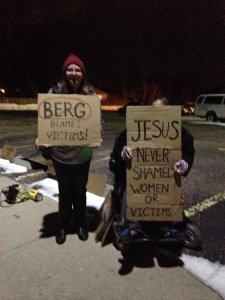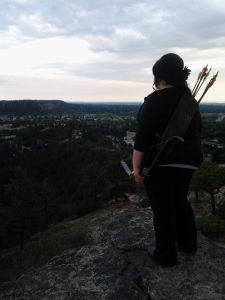Editorial Note: The following is reprinted with permission from Eleanor Skelton’s blog. It was originally published on February 10, 2015.
A couple of weeks ago, I organized a protest group picketing Jim Berg’s “Christian Growth Bible Conference” at Grace Bible Church in Colorado Springs.
I’m a recently unsheltered homeschool kid.
Social justice was frowned upon.
When Martin Luther King Day rolled around or the civil rights movement came up, my parents said racism was wrong but the oppressed group should still respect the authority God placed over them, citing verses like 1 Tim. 2:1-3 and 1 Peter 2:13-15.
Funny how we ignored that little bit about Jesus cleansing the temple, telling off the Pharisees. Oh right, Jesus was an exception because he was God and his anger was righteous. We are but flawed humans, don’t you know.
Kind of like this tweet:
So my friends and I turned to social media and alerted the local TV and radio stations. 98.9 Magic FM interviewed me.
We gathered at the church with handmade cardboard signs around 6:30 pm, as the cars began to pile in.
One suburban pulled up and rolled down a window. “What does your sign say?” the driver asked.
I replied, “Berg blames victims.”
He looked confused. He answered, “For what?”
“For their rape,” I said. “Berg’s unethical counseling affected nearly 200-300 people over 30 years…”
He drove away.
But one couple approached us, said they wanted to hear the other side. They had never heard of Berg before the church announced the conference.
One of my friends handed them one of the flyers she made, with a QR code linking back to my blog.
They offered us water and asked honest questions before going in, and later read my blog post, sparking a discussion that left 17 comments.
Deacons from the church brought coffee and cookies. The others and I decided not to accept them, leaving a pointed note.
We left flyers on the parked cars, then decided to walk down the street to warm up before the conference let out.
Then a car pulled up.
A lady pulled up, asking for me. She said she’d driven several hours to come after a friend shared our social media posts with her. She said she was going to ask some questions.
And she hugged me. Really hugged me.
I told her this was the church that had shunned me two years ago.
She said she was once a fundamentalist, and was so sorry for what I had experienced. She held me and said, “This is not your Jesus,” and blessed me in the name of the Father, Son, and Holy Spirit.
I wanted to cry.
I never thought I’d see anyone cross over from the other side, blessing me with healing.
Follow up comments on my blog and other social media were encouraging. We told people at the church who hadn’t been following Bob Jones in the news, who had no idea about the GRACE report and Berg’s involvement.
We broke through the silence.
Libby Anne recently reminded us that Bill Gothard was brought down by a blog, that blogging is a valid form of righting wrongs.
I want to continue these kinds of efforts, to see real change in churches and homeschool communities. Which is what my next series is about.









